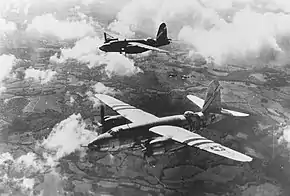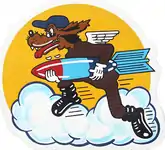585th Bombardment Squadron
The 585th Bombardment Squadron is an inactive United States Air Force unit. Its last was assigned to the 394th Bombardment Group, stationed at Bolling Field, District of Columbia. It was inactivated on 31 March 1946.
| 585th Bombardment Squadron | |
|---|---|
 394th Bombardment Group B-26 Marauders over France | |
| Active | 1943–1946 |
| Country | |
| Branch | |
| Role | medium bomber |
| Engagements | European Theater of Operations[1] |
| Decorations | Distinguished Unit Citation French Croix de Guerre with Palm[1] |
| Insignia | |
| 585th Bombardment Squadron emblem (approved 5 December 1943)[1] |  |
| Fuselage code[2] | 4T |
History
Activated as a B-26 Marauder medium bombardment squadron in mid-1943. Trained under Third Air Force and deployed to European Theater of Operations in March 1944. Initially being stationed in England and assigned to IX Bomber Command,
Engaged in tactical bombardment of enemy targets in Occupied Europe initially from stations in England, then after D-Day, moved to Advanced Landing Grounds in France and Belgium; advancing eastward as Allied ground forces advanced. Supported Eighth Air Force strategic bombardment missions over Nazi Germany and Occupied Europe; striking enemy airfields to obtain maximum interference in Luftwaffe day interceptor attacks on heavy bomber formations returning to England. Also participated in Western Allied Invasion of Germany, March–April 1945, combat ending with German Capitation in May 1945.
Became part of the United States Air Forces in Europe performing occupation duty in Germany while squadron demobilized personnel in 1945. Squadron reassigned to the United States as a paper unit, inactivated in March 1946.
Lineage
- Constituted 585th Bombardment Squadron (Medium) on 15 February 1943
- Activated on 5 March 1943
- Redesignated 585th Bombardment Squadron, Meium on 9 October 1944
- Redesignated 585th Bombardment Squadron, Light on 3 December 1945
- Inactivated on 31 March 1946[1]
Assignments
- 394th Bombardment Group, 5 March 1943 – 31 March 1946[1]
Stations
|
|
Aircraft
- Martin B-26 Marauder, 1943–1945
- Douglas A-26 Invader, 1945–1946[1]
References
Notes
- Maurer, Combat Squadrons, pp. 673-674
- Watkins, p. 110
- Station number in Anderson.
- Station number in Johnson.
- Station information in Maurer, Combat Squadrons, pp. 673-674, except as noted.
Bibliography
![]() This article incorporates public domain material from the Air Force Historical Research Agency website http://www.afhra.af.mil/.
This article incorporates public domain material from the Air Force Historical Research Agency website http://www.afhra.af.mil/.
- Anderson, Capt. Barry (1985). Army Air Forces Stations: A Guide to the Stations Where U.S. Army Air Forces Personnel Served in the United Kingdom During World War II (PDF). Maxwell AFB, AL: Research Division, USAF Historical Research Center. Archived from the original (PDF) on 23 January 2016. Retrieved 28 June 2017.
- Johnson, 1st Lt. David C. (1988). U.S. Army Air Forces Continental Airfields (ETO) D-Day to V-E Day (PDF). Maxwell AFB, AL: Research Division, USAF Historical Research Center. Archived from the original (PDF) on 29 September 2015. Retrieved 26 June 2017.
- Maurer, Maurer, ed. (1983) [1961]. Air Force Combat Units of World War II (PDF) (reprint ed.). Washington, DC: Office of Air Force History. ISBN 0-912799-02-1. LCCN 61060979. Retrieved 17 December 2016.
- Maurer, Maurer, ed. (1982) [1969]. Combat Squadrons of the Air Force, World War II (PDF) (reprint ed.). Washington, DC: Office of Air Force History. ISBN 0-405-12194-6. LCCN 70605402. OCLC 72556.
- Watkins, Robert (2008). Battle Colors. Vol III Insignia and Markings of the Ninth Air Force In World War II. Atglen, PA: Shiffer Publishing Ltd. ISBN 978-0-7643-2938-8.